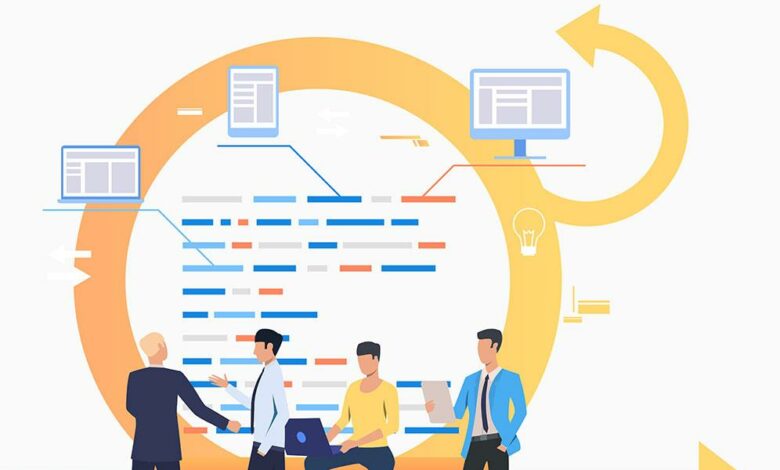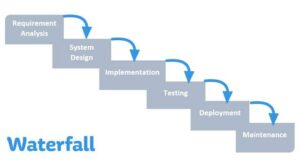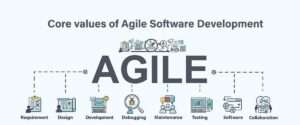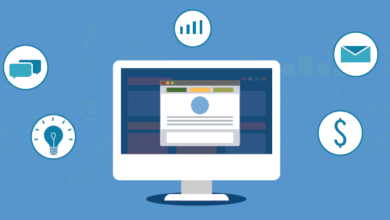5 Important Things Every Business Should Know About Agile Software Development

Nearly two decades after the Agile revolution began, it’s safe to say that software development has been irreversibly impacted by the widespread adoption of Agile principles.
Agile app development substitutes the long-established, linear “Waterfall” development paradigm, which requires the projects to be preplanned, documented, and fully produced before being handed over for testing. Agile offers an iterative approach in which small sections of projects are built and tested at the same time. Companies in India have adopted Agile for numerous reasons, including increasing product innovation, meeting customer expectations more quickly, shortening delivery cycles, reducing risk, and increasing productivity.
How does Waterfall lack?
To appreciate Agile’s benefits, you must first understand the traditional software development process, known as “Waterfall.” Waterfall projects typically begin with comprehensive documentation of the requirements (functional, technical, marketing, product, etc) that may take several weeks or even months to complete. Only after all of this paperwork has been accepted, the actual development will begin.

Once the development commences, it will continue till all parts of the app have been coded to specification, at which point the quality assurance team will take over. Meanwhile, the market environment may change, causing client requirements to shift, hence the app developers may have to make significant changes in the code.
However, because they have already done coding for the specifications that were set months ago and a substantial portion of the development money has already been spent, meeting the new client’s requests will add extra monetary pressure and set back the development process by painfully large time. This will additionally push back all subsequent phases, QA, client testing, and launch. As a result, the application fails to meet the needs of both customers and businesses.
What is Agile Software Development in easy words?
The Agile process is driven from the word agility which is an admirable quality when in dicey situations. To keep the mobile app development process agile, it is handled in form of modules or iterations. The full development cycle is divided into smaller parts which may take up to 1 to 4 weeks of an iteration. Each iteration is a whole project in itself, with requirements, documentation, design, code, and testing included.
Although each iteration may not have enough logical functionality, the goal is to have a bug-free release at the end of each iteration.

The client is always informed about the project’s progress in Agile mobile app development, and he determines (together with the team) what should be done in the next sprint. All the iterations are patched together in the end to have a full-fledged working mobile app.
Throughout the project, a list of expected features and qualities for the end product is compiled and stored in the product backlog. The backlog features are arranged in priority order, from most vital to least important. The product owner is the person who is in charge of the backlog items. The project team and app developers determine the amount of work that must be completed in each iteration.
As you can see, Agile methodology responds to changing market conditions, allowing your product to become more relevant to clients. If there are any changes required in the meantime, or additions to be made, only the specific part of the development has to be reiterated rather than shuffling with the whole code.
Advantages of shifting to Agile
Agile project management offers several project-specific benefits to project teams, app developers, sponsors, project leaders, and clients, including:
- Solutions can be deployed more quickly
- Enhanced adaptability to change and improved flexibility
- Lowered wastage of resources
- More chance of success as a result of more concentrated efforts
- Accelerated turnaround time
- Issues and flaws are detected more quickly
- Optimized development process
- Improved project control and a greater focus on individual customer requirements
- Collaboration and feedback will occur more frequently
Five core values of Agile Software Development

1. Processes and tools are less significant than individual relationships
The development process is driven by people, who respond to business needs. They are the most crucial aspect of development and should be prioritized over methods and tools. The Agile manifesto explains that if development is powered by processes or tools, it leaves lesser scope for change. Instead, Agile prefers humanizing the process. People should be in charge of taking decisions to adapt to the changes to meet client needs.
2. The emphasis is on working software rather than extensive documentation
Prior to Agile, a lot of time was spent documenting the product as it was being developed for delivery. This usually took up a significant amount of time and the mobile app development process would be slowed significantly.
Agile does not completely waive off the requirement for documentation, it just helps streamline it through user stories. In this way, the app developer has all the sufficient information needed to complete the task at hand.
3. To figure out the mechanics of delivery, Agile focuses on collaboration among the stakeholders rather than contract negotiations
Collaborating with consumers involves including them throughout the development process, not just at the start and finish, thus making it relatively easier for teams to meet their customers’ needs. In Agile software development, demos are presented to the customer from time to time. The interaction does not limit here. The emphasis is laid on customers attending all the product meetings and interacting with the app developers on the daily basis, more to the projects that are outsourced to India.
4. An emphasis on accommodating the change
Change used to be avoided in traditional development since it was seen as an unwelcome expense and rightly so. This is where Agile shines. As discussed above, the modular nature of Agile makes room for easy adjustments. Since any change is most likely to only disrupt a couple of iterations, teams can tailor the process to accommodate the change. Overall, Agile mobile app development considers change to be a constant opportunity to improve the project and generate value.
5. Prioritization of features
Each feature or strategy is not equally significant. Prioritization of work is emphasized in Agile approaches, so high-value tasks are prioritized first. Although Agile is soon becoming a trend even for smaller projects, large-scale projects are more likely to benefit from it. The app development projects which seem to have a never-ending list of features are often monotonous and exhausting for the developers. As a result such projects often encounter delays. Agile offers a refreshing reset with each iteration keeping the things ‘agile’.
Key Agile Skills
All project managers should have the following six essential Agile project management expertise:
- Ability to sift through unimportant tasks and concentrate exclusively on the most important ones
- Aptitude to remain calm under pressure and have sound judgment all the time
- To guide and encourage teams throughout a project, they need strong motivation and coaching skills
- Excellent organizational skills for keeping track of and prioritizing tasks
- Decisive nature to think swiftly and make quick decisions when things change quickly
- A high level of flexibility is required to accept change and avoid undue misunderstanding
The future of Agile
Agile offers multiple benefits as competition grows and time to market shrinks. Agile or hybrid techniques will grow more important as more companies transition to a digital workplace that values speed, flexibility, and higher productivity. Agile adoption rates will continue to rise across businesses throughout the world due to its application in numerous industries and alignment with the benefits afforded by a digital workplace paradigm.
Agile project management is a fascinating and engaging method of software development. The results are a more fulfilling experience for everyone involved when product developers and customers are involved in the planning and implementation stages.
Author Bio:

Ranjit Singh is the founder & Director of RV Technologies and has been an avid technical blog writer too. His passion for business and writing informative articles on mobile app development is commendable. With years of experience in the IT industry, he has been able to bring up the best marketing solutions through app development that guides you at each and every step.



